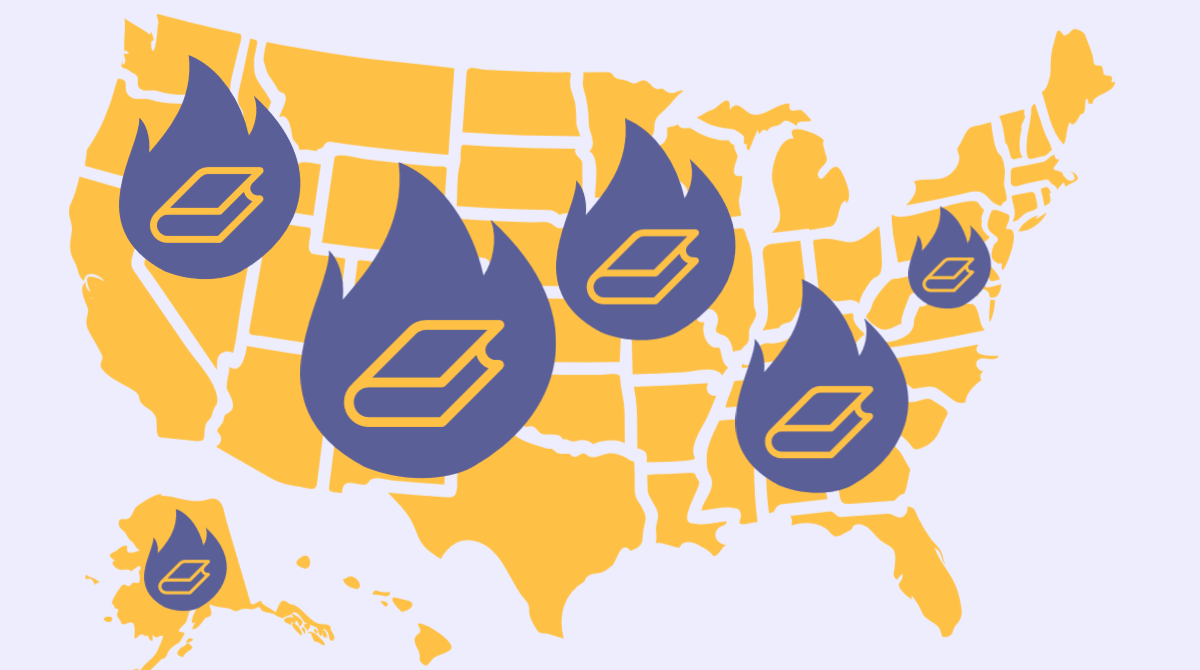Libraries and schools across the country are experiencing unprecedented levels of attempts to ban or remove books from their shelves. I Love Libraries will continue to raise awareness by highlighting attempts to censor library materials, as well as efforts by librarians, parents, students, and concerned citizens to push back against them. This report includes news from West Virginia, Oregon, and New Jersey.
West Virginia librarians could be criminally charged over “obscene” books
The West Virginia legislature is considering a bill that would remove protections for librarians if minors come across books that contain what the state considers "obscene" material at their facilities, reports ABC News.
HB 4654 passed the West Virginia House of Delegates on February 16 by a vote of 85–12, along party lines. The bill would remove criminal exemptions for schools, public libraries, and museums that distribute or display “obscene matter” to a minor, even if the minor’s parent or guardian is present. Any employees of those institutions found guilty of giving minors obscene matter can face fines of up to $25,000, up to five years in prison, or both.
Critics say the bill would lead to an increase in book challenges and potentially lead to criminal charges against librarians for books that are not pornographic, but books that include sexual content including classical literature.
"It is going to cost our counties and our librarians when these matters go to the court system," said Democratic House Minority Leader Sean Hornbuckle in a hearing on the bill. "This is a very dangerous bill."
Oregon Senate passes anti-book-ban bill
School districts in Oregon would be unable to ban books simply because authors or characters are immigrants, people of color, LGBTQ+, disabled, or from other protected classes under a bill passed by Oregon State Senate Democrats February 27, reports the Oregon Capital Chronicle.
Senate Bill 1583 passed on a 17-12 party line vote after a heated hour-long debate that included one Republican accusing his Democratic colleagues of wanting to encourage pedophilia and another saying racism is “insignificant.” The bill now heads to the Oregon House of Representatives.
Sen. Lew Frederick, D-Portland, describes Senate Bill 1583 as a “simple” defense of free speech and a way to guarantee that all children in Oregon see themselves represented in books in school libraries and classrooms.
“I want to see kids reading and getting books out of their libraries, and I lament that this bill has been politicized,” Frederick said. “This bill is not about politics for me. It’s about kids reading.”
New Jersey bill would protect librarians from harassment amid push to ban books
Democrat lawmakers in New Jersey are looking to address social media trolling and harassment that school librarians have faced in some New Jersey districts over calls to ban or remove books from their library shelves, reports NorthJersey.com.
A new state bill called the “Freedom to Read Act” requires school boards to adopt policies governing material and its removal from school libraries. If it becomes law, the bill would also protect librarians from being sued by people who disagree with their book choices.
The bill would require school boards to create a policy governing what materials are in district libraries, as well as a policy regarding their removal. School boards would craft their policies based on a model policy created by the state librarian in collaboration with the state education commissioner and the New Jersey Association of School Librarians.
The bill would also apply to public libraries and their governing boards.
Libraries would have to provide “diverse and inclusive” materials that concern protected classes in New Jersey’s Law Against Discrimination. In schools, these materials would have to be age- and grade-appropriate. Books by and about racial minorities and LGBTQ+ themes are the most widely targeted subject matter for book bans.
The bill would also give librarians immunity from being sued for “just doing their job,” said Sen. Andrew Zwicker, D-Somerset, the bill's co-sponsor. A school library media specialist, a teaching staff member, a librarian or any other staff member of a public library would be “immune from criminal or civil liability,” language in the bill says.
The bill will have its first hearing next month in the Senate Education Committee. Zwicker says he expects it to become law.
Take action
Alarmed by the escalating attempts to censor books? Here are five steps you can take now to protect the freedom to read.
- Follow news and social media in your community and state to keep apprised of organizations working to censor library or school materials.
2. Show up for library workers at school or library board meetings and speak as a library advocate and community stakeholder who supports a parent’s right to restrict reading materials for their own child but not for all
3. Help provide a safety net for library professionals as they defend intellectual freedom in their communities by giving to the LeRoy C. Merritt Humanitarian Fund.
4. Educate friends, neighbors, and family members about censorship and how it harms communities. Share information from Banned Books Week.
5. Join the Unite Against Book Bans movement and visit our Fight Censorship page to learn what you can do to defend the freedom to read in your community.
Subscribe to the I Love Libraries newsletter! You'll get monthly updates on library news, advocacy updates, book interviews, book info, and more!



